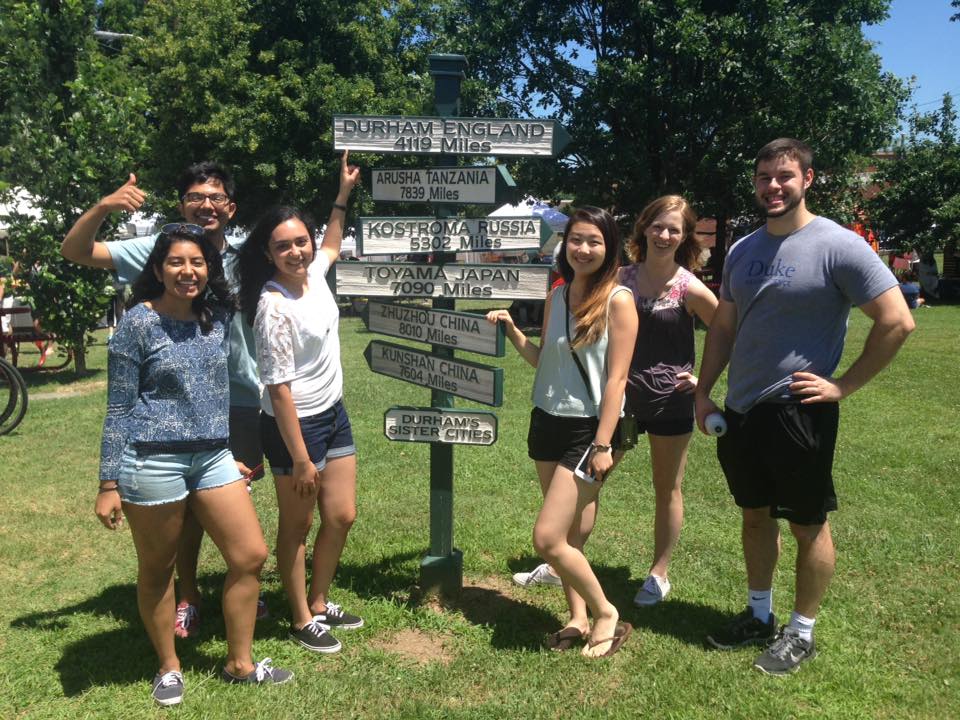A man is staring at me with an intense expression and a cart of steaming dishes before him as muffled shouts exit behind his surgical mask. With suds up to my elbows and hands buried in sink water, I wondered how I could possibly be washing dishes incorrectly. “I’m sorry, what did you say, sir?” The man pulled down his mask, and repeated the unthinkable:
“You are a valuable person.”
My first day at Threshold Clubhouse had me serving in the kitchen unit, and when I expected to be scolded for my lack of experience in the food service industry, here was a member of the clubhouse, repeating what he had undoubtedly been told during his time at the organization. He was valuable, and therefore I was deemed valuable. After that moment, any anxiety I had about serving with those who had mental illness evaporated like the steam off of his sanitized dishes.
As you might have read in other Durham student’s posts, Threshold Clubhouse is a psychosocial rehabilitation program in the form of a work-ordered day where members gain skills to pursue further employment and reduce hospitalization and symptoms. The model is grounded not in doing things to those with mental illness or for those with mental illness, but with members. The distinction is crucial. I am a rising junior pursuing a Bachelor’s of Science in Psychology with minors in Neuroscience and Statistical Sciences, hoping to be a clinician or researcher to aid those with psychiatric disorders. Therefore, I am pursuing a path which ultimately surrounds doing services for patients. Such an approach is by no means a bad one as clinicians are an essential part of the treatment process. However, there is a difference between treatment and recovery.
When I first interviewed at Threshold, the director warned that psychology in theory is a disparate reality from psychology in daily life. At the time, I couldn’t understand what she meant, but now I realize there were no truer words. My classwork in psychology gave me the preparation to understand if people show presenting symptoms in the clubhouse; the classes prepared me to understand the medication members take and the side effects that could occur. However, without a practicum in my two years of studies, I have not had the chance to consider the intricacies of recovery after there are no longer presenting symptoms. Where else could I learn about unexpected termination of a college education because “college got scary”? Where could I then learn about the impact that the halt in education has on job acquisition and income? Where else could I understand the pragmatics of living in a group home? Where else could I confront the questions of economic and racial privilege as variables impacting return to a normal life? Where else would I focus on the many skills of members rather than on symptoms? I could not be more grateful to have the opportunity to work alongside those who have schizophrenia, bipolar disorder, major depression, and other psychiatric disorders and would recommend that anyone pursuing a career as a mental healthcare professional to consider service at a clubhouse.
Aside from learning a multitude of lessons from the members while working with them in the Kitchen, Snack Bar, Clerical Unit, and in Employment and Development, there have been abundant opportunities to serve the staff in the past three weeks. One project was based in streamlining the donation recording process as to track donor retention and thank contributors appropriately. Since members run the entire clubhouse, a special part of this project was focusing on sustainability by creating a system so that a member could process checks and record the gifts as part of their daily work. It’s so encouraging to know that the work will continue to help the clubhouse for years to come! Other projects to serve the staff included consolidating the list of newsletter recipients, preparing the clubhouse for a Giving Tuesday campaign, creating a system of matching expenditures against the grants, and finding some information to help members learn how to best budget their discretionary funds. Currently I am working with the director of the clubhouse to research measurable outcomes of the empirical success for clubhouses in the state of North Carolina so that they can be equipped to present evidence for more support from federal and grant funding as well as seek to improve the clubhouse’s internal structure.
With just over two weeks left serving at Threshold Clubhouse, I cannot wait to spend more time with members and continue learning from them and the staff!

You’re learning a valuable lesson in the Clubhouse – people with mental illness are people first, and not defined by their illnesses. I run a NAMI Family Support Group and this is a main principle for us and is critical to help our loved ones. I congratulate you on your choice and hope that you will continue in your journey. We have so few high-quality mental health care providers and such a great need.
LikeLike
What a wonderful example of the relationship between throw and practice. Exactly why we created DukeEngage and you are living it.
LikeLike